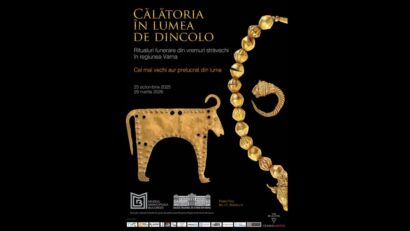Surrealist theorist and poet Gherasim Luca
A look at the life and work of one of the most original literary voices to come out of Romania.

România Internațional, 28.09.2013, 13:39
“Gherasim Luca was the man who relentlessly pushed language toward its limits, which he transmuted from a mere instrument of representation into an extreme style of intensities. Luca knew how to stammer not just words, but language itself.” This is how the celebrated French philosopher Gilles Deleuze described the Romanian-Jewish avant-garde writer Gherasim Luca in his book “Two Regimes of Madness”. According to literary critic Petre Raileanu, it was the monthly magazine “Dilemateca” that revealed a piece of information which, in his opinion, “completes the corpus of Romanian surrealism with one of its essential texts.” It was the discovery of the Romanian manuscript of “The Passive Vampire”, initially thought to have been written directly in French, that Petre Raileanu referred to. The manuscript written in Romanian is important in order to better understand Gherasim Luca’s work.
Gherasim Luca is in fact the pen name of Salman Locker, who also wrote under the names Zolman Locker, Costea Sar and Petru Malcoci. The avant-garde writer was born in Bucharest, into the family of a Jewish tailor, Berl Locker, who died in 1914. Luca spoke Yiddish, Romanian, German and French. Starting 1938 he travelled frequently to Paris, where he was introduced to Surrealist circles. WWII and the emergence of anti-Semitism in Romania forced him into local exile. From 1945 until 1947 he founded a surrealist artists group, together with Gellu Naum, Paul Paun, Virgil Theodorescu and Dolfi Trost. They soon started to publish their works, including poems in French and invented “cubomania”, a method of making collages in which a picture or image is cut into squares and the squares are then reassembled without regard for the image.
Together with Dolfi Trost, he authored the famous manifest “The Dialectic of Dialectic”. Harassed in Romania and caught while trying to flee the country, the self-called “étran-juif”, that means “StranJew”, finally left Romania in 1952, and moved to Paris, via Israel. Gherasim Luca was a Surrealist theorist and a Romanian-Jewish poet, frequently cited in the works of Gilles Deleuze and Felix Guattari. He joined the avant-garde movement at a young age, being a prominent member of the surrealist group in Alge (1930,1933). In the second surrealist wave, he joined a group made up of Gellu Naum, Victor Brauner and Jack Herold.
Professor Ion Pop from Cluj-Napoca, who has studied Gherasim Luca’s work, has told us more about the writer:
Ion Pop: “It’s true that in the last years of his life Gherasim Luca made a sensation with several public readings. He was a gifted reciter. I’ve heard several recordings of him and I noticed his Romanian accent was unaltered. He continued to publish many books, one more inventive than the other, counting on a sort of a game of words, as the playful side of the language he used is more than obvious. He is now one of the important names of French poetry. Gherasim Luca led a very interesting life and kept in touch with a few friends from Romania. Given his connection with Romania he lived rather isolated, was marginalized and his recognition came a lot later than he would have deserved.”
To mark his birthday centennial, the Romanian Peasant Museum in Bucharest has devoted an entire evening to Gherasim Luca’s poetry, which enjoyed the participation of poet Valery Oisteanu, who settled in the US.
In 1988, Gherasim Luca was nominated for the prestigious Neustadt International Prize for Literature, alongside René Char, Milan Kundera, and Léopold Senghor, but Gherasim Luca withdrew himself from competition when learning he was among the top three candidates. His brief response to the jurors was: “I don’t accept literary prizes.” The same year, the TV-portrait by Raoul Sanglas, “Comment sen sortir sans sortir”, made him famous for a larger readership.
In 1994, on February 9, at the age of 80, he committed suicide by jumping into the Seine. He had spent forty years in France, without papers, and could not cope.






























